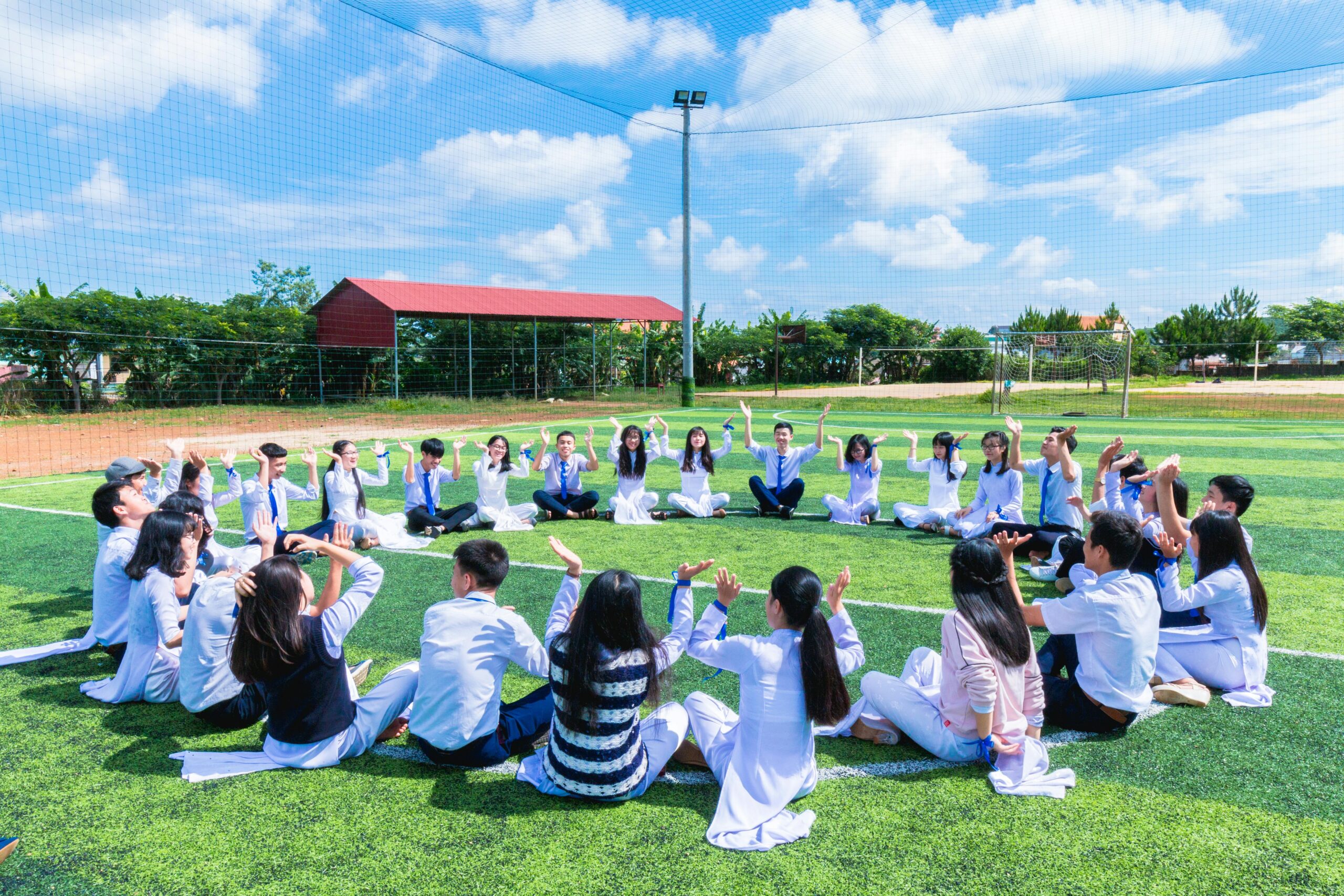Understanding IB Curriculum Levels
When it comes to choosing the right IB program for your child, understanding the various curriculum levels is crucial. The International Baccalaureate (IB) offers three main programs: the Primary Years Programme (PYP), the Middle Years Programme (MYP), and the Diploma Programme (DP). Each program is tailored to specific age groups and educational needs, providing a comprehensive and cohesive learning experience. Here’s a breakdown to help you navigate these options for your child in Ontario.
Primary Years Programme (PYP)
The Primary Years Programme (PYP) is designed for students aged 3 to 12. This program focuses on developing young students into active, caring, and lifelong learners. The PYP curriculum is built around six transdisciplinary themes that guide students in their exploration of key concepts. These themes include “Who We Are,” “Where We Are in Place and Time,” “How We Express Ourselves,” “How the World Works,” “How We Organize Ourselves,” and “Sharing the Planet.” These themes help students connect their learning to real-world contexts, making education meaningful and engaging.
In the PYP, the emphasis is on inquiry-based learning. Students are encouraged to ask questions, conduct research, and present their findings. This approach fosters curiosity and a love for learning, which are essential at this early stage. Additionally, the PYP promotes social and emotional development, teaching students to collaborate, communicate, and reflect on their learning experiences. It’s not just about academics; it’s about building a strong foundation for future success.
Middle Years Programme (MYP)
The Middle Years Programme (MYP) caters to students aged 11 to 16. This program bridges the gap between the PYP and the DP, offering a framework that encourages students to make practical connections between their studies and the real world. The MYP is structured around eight subject groups: Language Acquisition, Language and Literature, Individuals and Societies, Sciences, Mathematics, Arts, Physical and Health Education, and Design. This diverse curriculum ensures a well-rounded education.
One of the standout features of the MYP is the Personal Project. This is a long-term assignment that allows students to explore a topic of personal interest. The Personal Project helps students develop essential skills such as research, critical thinking, and time management. It also provides an opportunity for students to showcase their creativity and innovation. The MYP aims to develop students who are independent learners and global citizens, ready to take on the challenges of the Diploma Programme.
Diploma Programme (DP)
The Diploma Programme (DP) is intended for students aged 16 to 19. It’s a challenging and rigorous program that prepares students for university and beyond. The DP curriculum consists of six subject groups: Studies in Language and Literature, Language Acquisition, Individuals and Societies, Sciences, Mathematics, and the Arts. In addition to these subjects, students complete three core components: the Extended Essay (EE), Theory of Knowledge (TOK), and Creativity, Activity, Service (CAS).
The Extended Essay is a 4,000-word research paper on a topic of the student’s choice. It develops students’ ability to conduct independent research and articulate their findings. Theory of Knowledge is a course that explores the nature of knowledge and encourages critical thinking about various ways of knowing. Creativity, Activity, Service involves students in artistic, physical, and community service activities, fostering a balanced and reflective approach to learning.
The DP is highly regarded by universities worldwide for its rigorous academic standards and emphasis on critical thinking, research, and community engagement. Students who complete the DP are well-prepared for higher education and have a competitive edge in university admissions.
Choosing the Right Program
Deciding which IB program is right for your child depends on their age, learning style, and educational goals. The PYP lays a strong foundation with its focus on inquiry-based learning and emotional development. The MYP builds on this by encouraging practical applications and personal projects. The DP prepares students for the academic demands of university and beyond, emphasizing independent research and global awareness.
Each program offers a unique approach to education, but they all share the IB’s commitment to developing well-rounded, thoughtful, and knowledgeable students. By understanding these curriculum levels, you can make an informed decision that best supports your child’s educational journey in Ontario.

Key Factors to Consider for Ontario Parents
Choosing the right school for your child is a significant decision, especially when looking at IB programs in Ontario. There are several key factors to consider, including school location, facilities, teacher qualifications, and extracurricular offerings. These elements can greatly impact your child’s educational experience and development. Here’s a detailed look at what to keep in mind.
School Location
The location of the school is a major consideration for any parent. You want a school that is conveniently located, reducing the daily commute stress for both you and your child. Proximity to home can make it easier to participate in school events and parent-teacher meetings. Additionally, a school in a good neighborhood often translates to a safer environment. Consider schools in areas like Toronto, Ottawa, and Mississauga, which are known for their reputable IB programs and accessible locations.
Facilities
The facilities a school offers can make a big difference in your child’s day-to-day learning experience. Look for schools with modern classrooms, well-equipped science and computer labs, and extensive libraries. Good sports facilities and playgrounds are also important for physical education and recreation. Many IB schools in Ontario pride themselves on state-of-the-art facilities that support a wide range of academic and extracurricular activities. Visit the schools if possible to get a firsthand look at the facilities and ensure they meet your expectations.
Teacher Qualifications
Qualified and experienced teachers are the backbone of any good educational program. When considering IB schools, pay attention to the qualifications and experience of the teaching staff. Teachers should have relevant degrees and certifications, as well as experience in the IB curriculum. Additionally, look for schools that invest in ongoing professional development for their teachers. This ensures that educators are up-to-date with the latest teaching methods and educational technologies. Schools that highlight their commitment to high-quality teaching staff often provide a better learning environment for students.
Extracurricular Offerings
Extracurricular activities play a crucial role in a child’s overall development. They provide opportunities for students to explore interests beyond academics, develop new skills, and make new friends. When evaluating IB schools, consider the range and quality of extracurricular programs offered. Look for schools that provide a variety of options, from sports and arts to science clubs and community service initiatives. Strong extracurricular programs not only enhance your child’s school experience but also help in building a well-rounded personality. Schools with a broad array of activities often produce students who are more engaged and motivated.
Academic Support
Another important factor to consider is the level of academic support provided by the school. Some students may need extra help in certain subjects, and a good school will offer resources to support them. Look for schools with robust tutoring programs, counseling services, and special education resources. Schools that prioritize academic support help ensure that all students can succeed, regardless of their individual challenges. Additionally, schools that offer personalized learning plans can better cater to the unique needs of each student.
Community and Culture
The school’s community and culture are also essential aspects to consider. A welcoming and inclusive school culture can make a significant difference in your child’s happiness and comfort. Look for schools that promote diversity, equity, and inclusion. Schools with strong parent-teacher associations and active community engagement often create a supportive and collaborative environment. Visiting the school and talking to other parents can give you a sense of the school’s culture and community spirit.
School Reputation
Finally, consider the reputation of the school. Research online reviews, ratings, and feedback from other parents. Schools with a strong reputation for academic excellence, student support, and extracurricular success are likely to provide a better overall experience. You can also look at the school’s track record in IB exam results and university placements. A school with a good reputation will likely have a history of producing successful and well-prepared graduates.

Visiting and Assessing Schools: Tips for Ontario Parents
Visiting and assessing schools is a crucial step in choosing the right educational environment for your child. It allows you to get a firsthand look at the school’s atmosphere, facilities, and teaching staff. Here are some practical tips on scheduling visits and what to look for during school tours to help you make an informed decision.
Scheduling Visits
Scheduling visits can sometimes be tricky due to your busy schedule and the school’s availability. Start by calling the school to inquire about their visiting hours and whether they offer guided tours. Many schools have open house events specifically for prospective parents, which can be a great opportunity to visit. Be sure to book your visit well in advance to secure a convenient time slot. If you can, try to visit during school hours to see the school in action.
It’s also a good idea to bring a list of questions with you. This ensures that you don’t forget to ask about important aspects of the school. Ask about the daily schedule, class sizes, teacher qualifications, and any specific programs or services you’re interested in. Knowing what questions to ask ahead of time will help you gather the information you need.
Observing the Classroom Environment
When visiting the school, pay close attention to the classroom environment. Look for classrooms that are bright, clean, and well-organized. The layout should be conducive to learning, with comfortable seating and adequate resources like books, computers, and learning materials. Observe how the teachers interact with students. Are they engaging and supportive? Do students seem engaged and happy? These observations can give you a good sense of the overall learning environment.
It’s also helpful to note the student-to-teacher ratio. Smaller class sizes often mean more individualized attention for students. Ask about how the school supports students with different learning needs. Schools that offer differentiated instruction and additional support for students who need it can make a big difference in your child’s education.
Evaluating School Facilities
School facilities can greatly impact your child’s educational experience. During your visit, take time to tour the entire campus. Check out the library, science labs, computer labs, sports facilities, and playgrounds. Are the facilities well-maintained and up-to-date? Modern and well-equipped facilities can enhance the learning experience and provide students with more opportunities to explore their interests.
In addition to the physical facilities, ask about the extracurricular activities offered. A school with a wide range of extracurricular programs can help your child develop new skills and interests. Look for schools that offer activities that align with your child’s interests, whether it’s sports, music, art, or academic clubs.
Meeting the Staff and Administration
Meeting the staff and administration is a key part of assessing a school. The principal and teachers should be approachable, knowledgeable, and passionate about education. During your visit, try to speak with a few teachers and ask about their teaching philosophy and approach. This can give you insight into the school’s educational culture.
Don’t forget to ask about the school’s communication policies. Effective communication between the school and parents is essential for your child’s success. Find out how the school keeps parents informed about their child’s progress, upcoming events, and any issues that may arise. Schools that prioritize open and regular communication with parents often have more engaged and satisfied families.
Observing Student Interaction
The way students interact with each other and with staff can tell you a lot about the school’s culture. During your visit, observe how students behave in the hallways, classrooms, and common areas. Are they respectful and cooperative? Do they seem happy and engaged? Positive student interactions are often a sign of a supportive and nurturing school environment.
If possible, talk to some current students or parents about their experiences at the school. They can provide valuable insights and help you get a better understanding of the school’s strengths and areas for improvement. Hearing firsthand accounts can be very reassuring and informative.





Parent and Student Testimonials: Real Stories from Ontario’s IB Families
When considering an International Baccalaureate (IB) program for your child, hearing from current students and their families can provide valuable insights. Their experiences can help you understand the benefits and challenges of the IB curriculum. In this section, we’ll share some testimonials from Ontario parents and students who have thrived in IB programs.
A Parent’s Perspective: Building Confidence and Independence
One parent, Lisa from Toronto, shared how the IB program transformed her daughter’s confidence and independence. “Before starting the IB program, my daughter was shy and unsure of her abilities. The challenging curriculum and supportive teachers helped her develop critical thinking skills and self-confidence. She’s now a proactive learner, ready to tackle any problem that comes her way.”
Lisa’s experience highlights how the IB program doesn’t just focus on academic excellence but also on personal growth. The rigorous coursework and emphasis on independent projects can help students become more self-reliant and confident in their abilities.
A Student’s Journey: Embracing a Global Perspective
Ryan, a Grade 11 IB student in Ottawa, expressed how the program has broadened his horizons. “The IB curriculum encourages us to think globally and understand different cultures. The Theory of Knowledge class, in particular, has made me question and appreciate diverse perspectives. I feel more prepared for a globalized world.”
Ryan’s testimonial underscores one of the key strengths of the IB program: its international outlook. By promoting intercultural understanding and respect, the IB program prepares students to be global citizens, a crucial skill in today’s interconnected world.
Academic Excellence: Preparing for University
Sarah, a parent from Mississauga, shared how the IB program set her son up for success in university applications. “My son, Mark, was accepted into his top-choice universities, thanks to the rigorous IB curriculum. The extended essay and internal assessments gave him a head start in research and writing skills. The IB diploma is highly respected by universities, and it opened many doors for him.”
Sarah’s story illustrates how the IB program’s emphasis on research and comprehensive assessments equips students with skills that are highly valued in higher education. The IB diploma is recognized worldwide, making it a strong credential for university applications.
Overcoming Challenges: A Collaborative Effort
Julia, a Grade 12 IB student from Hamilton, shared her challenges and triumphs. “Balancing the workload was tough at first, but the support from my teachers and classmates made a big difference. We formed study groups, and the collaborative environment helped us manage our time and stay motivated.”
Julia’s experience shows that while the IB program is demanding, the supportive community within IB schools can help students overcome challenges. The collaborative spirit fostered by the IB curriculum encourages students to work together, share knowledge, and support each other’s academic journeys.
Lifelong Friendships: The Social Benefits
Emily, a parent from London, Ontario, spoke about the social benefits her son gained from the IB program. “Apart from the academic rigor, my son made lifelong friends through the IB program. The group projects and extracurricular activities provided opportunities for him to connect with like-minded peers. These friendships have been incredibly valuable for his personal development.”
Emily’s insight highlights that the IB program isn’t just about academics. The emphasis on group work and extracurricular involvement helps students build strong social networks, fostering friendships that can last a lifetime.
A Teacher’s View: Fostering Intellectual Curiosity
Mr. Thompson, an IB teacher in Mississauga, shared his perspective on the program. “Teaching IB students is incredibly rewarding. They are curious, motivated, and eager to learn. The curriculum allows us to explore subjects in depth and encourages students to ask questions and think critically. It’s a joy to see them grow intellectually.”
Mr. Thompson’s testimonial provides a teacher’s view of the IB program’s impact. The curriculum’s focus on in-depth exploration and critical thinking fosters a stimulating learning environment where both students and teachers thrive.
Final Thoughts
These testimonials from parents, students, and teachers offer a glimpse into the transformative impact of the IB program. Whether it’s building confidence, fostering a global perspective, preparing for university, overcoming challenges, forming lifelong friendships, or fostering intellectual curiosity, the IB program provides a comprehensive educational experience.



